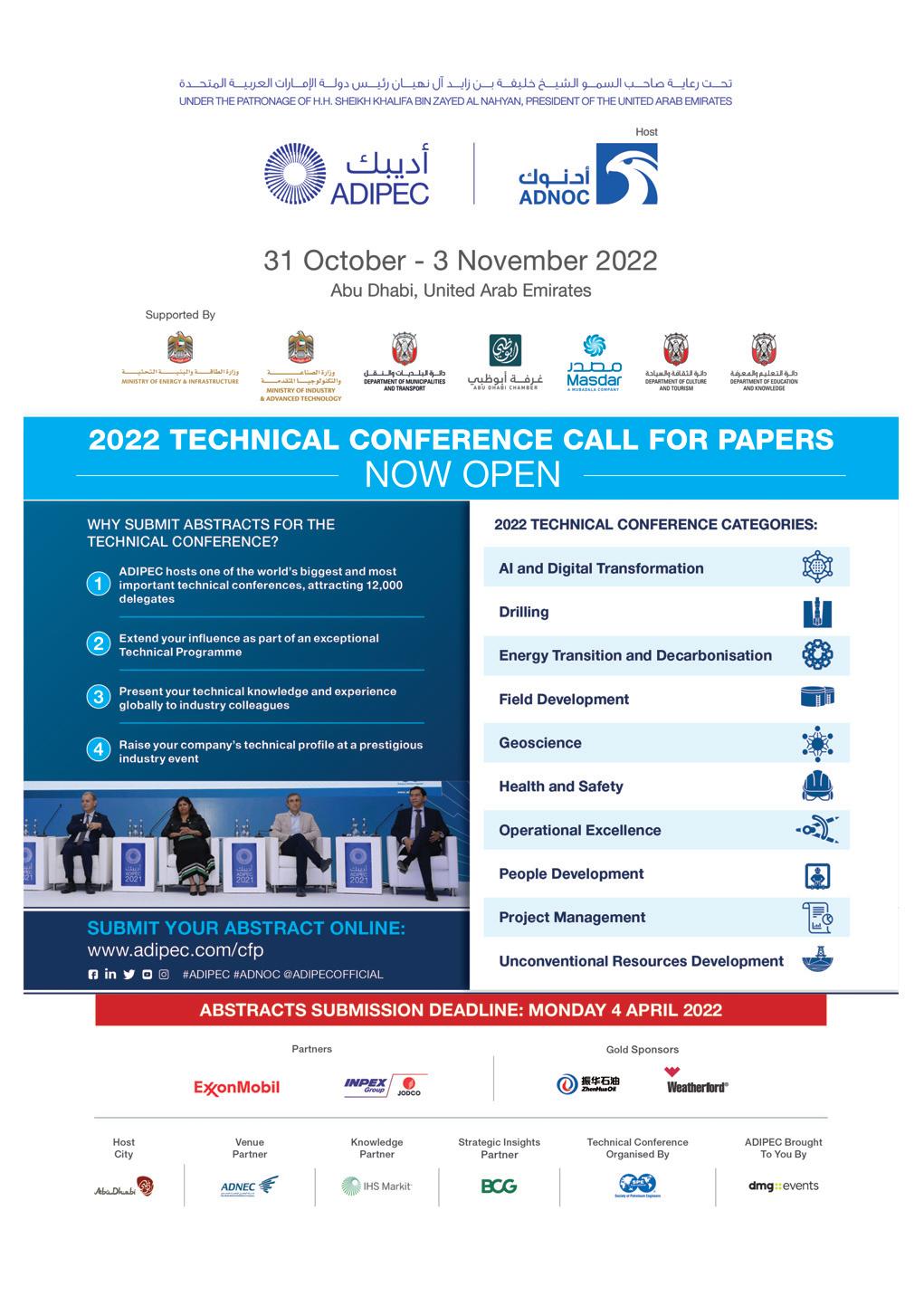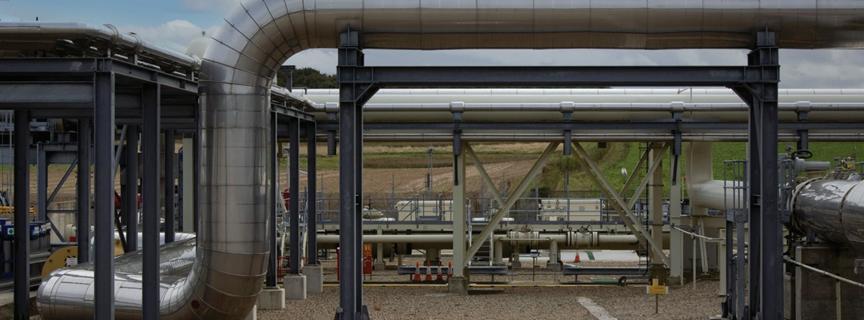
15 minute read
Oil and gas news in brief
Keeping you up to date with market leaders
latest
news
Abu Dhabi’s ADNOC and Masdar to join bp’s UK hydrogen projects
bphas taken a major step forward in strengthening its strategic partnership with ADNOC and Masdar of Abu Dhabi, bringing international participation to its planned blue and green hydrogen developments in Teesside in the north-east of England.
ADNOC – the UAE’s largest energy company – will take a 25% stake in the design stage of bp’s blue hydrogen project, H2Teesside. This will be ADNOC’s first investment in the UK. bp and ADNOC will now advance the project, initially to the next stage of design, the pre-FEED stage. H2Teesside is expected to kickstart the UK’s hydrogen economy at scale with the development of two 500MW hydrogen production units by 2030. The project is targeting start of operations in 2027.
Masdar – the Abu Dhabi renewable energy company – has also signed a memorandum of understanding to acquire a stake in bp’s proposed green hydrogen project, HyGreen Teesside. This project is planned to produce 60MWe (megawatt electrical input) of hydrogen at start-up in 2025, increasing to up to 500MWe by 2030.
Together, these two projects could deliver 15% of the UK Government’s recently expanded 10GW target for hydrogen in 2030. bp will also join ADNOC to evaluate a new blue hydrogen project in Abu Dhabi, conducting a joint feasibility study for a world-scale, low-carbon hydrogen project in the country. In addition, ADNOC, bp and Masdar have joined with Abu Dhabi Waste Management Centre (Tadweer) and Etihad Airways to explore production of sustainable aviation fuels, from hydrogen and municipal waste gasification, in the UAE.
Bernard Looney, bp’s Chief Executive said: “By joining forces with ADNOC and Masdar we are reinforcing the world-leading role that Teesside, and the UK more widely, can play in developing new supplies of energy, as well as new skills and supply chains. We’re backing Britain and the resources, capability and net zero ambition here in the UK make it ideal for the development of low carbon hydrogen.
“As well as boosting home-grown energy, the global nature of our partnership with ADNOC and Masdar will support our plans to decarbonise some of the most hard-to-abate sectors in the world – like industrial manufacturing, power and aviation. Partnerships like this reach beyond borders to provide the new energy solutions the world needs.”
HE Dr Sultan Ahmed Al Jaber, UAE Minister of Industry and Advanced Technology, ADNOC Managing Director and Group CEO, and Masdar Chairman, said: “In the UK, our role in Teesside will represent ADNOC’s first investment into the UK and help to accelerate innovation in decarbonisation of energy in industrial sectors. Similarly, the partners’ collaboration in Abu Dhabi is expected to further position the UAE as a regional leader in low-carbon energies and technology-driven industrial growth.”
Mohamed Jameel Al Ramahi, Masdar’s Chief Executive, added: “Masdar has been a long-standing investor in the UK’s renewable energy sector, and we will leverage our expertise in offshore wind and sustainable aviation fuels to support both nations’ energy transition while solidifying the UAE’s leadership position in the emerging green hydrogen economy.”
These new agreements follow from the formation of a strategic partnership for clean energy solutions in the UK and UAE between bp, ADNOC and Masdar in September 2021, including the intention to work together to develop low carbon hydrogen hubs, such as at Teesside. These initiatives are subject to relevant customary regulatory clearances.

Green hydrogen: a key to unlocking energy security in Europe

Siemens Gamesa has launched a white paper, Unlocking European Energy Security, outlining the energy supply challenges facing Europe since the invasion of Ukraine and the actions needed to bring about stability and energy security while addressing the climate emergency and delivering decarbonisation.
In the space of just three months in 2022, the importance and urgency of nations protecting and ensuring their energy supply increased dramatically. Geopolitical events have elevated energy security to the forefront of European governments’ concerns, both in terms of securing independent supply and securing predictable prices for the consumer.
In the years to the EU’s 2050 deadline for climate neutrality, renewable energy and green hydrogen will be of pivotal importance. In delivering energy security with clean, affordable and domestically produced clean energy and fuels, large-scale decarbonisation is possible simultaneously. Through the conversion of hard-to-abate industries to this green fuel, nations can hit the targets necessary to achieve net zero.
The importance of tackling both issues of energy security and decarbonisation together is highlighted by Siemens Gamesa global CEO Jochen Eickholt: “The current crisis should not be allowed to push the climate emergency down the agenda. It is imperative that the entire renewable energy ecosystem is aligned on the need to reduce the demand for fossil fuels. For green hydrogen to reach scale and, thus, competitiveness, it too needs a seismic shift in the scale and speed of renewables roll-out.”
The white paper highlights five levers which hold the key in unlocking energy security in Europe.
First, it suggests an increase in the volume of renewable energy produced in Europe; speeding up the process of permitting is critical to this.
Secondly, the paper recommends initiating green hydrogen infrastructure for transportation and distribution, whether that is domestically produced or imported, and develop a stable hydrogen trading market.
Creating innovate storage solutions to ensure continuity and predictability of supply and introducing flexible legislation enabling sector coupling to balance electricity demand and green hydrogen production was proposed next; while the fourth point was to introduce legislative and regulatory tools to create a market for EU-generated green hydrogen with guaranteed cost comparison against fossil fuel-based imports.
Fifth and finally, the white paper says the industry should industrialise the scale of production of the electrolyzers necessary to supply demand in Europe.
Juan Gutierrez, global CEO of Siemens Gamesa’s Service business said: “Siemens Gamesa calls upon European governments and the relevant industries to work together in coalition to deliver energy security through renewables and green hydrogen, environment security through essential decarbonisation and security of stable pricing of energy to end consumers.
“The terrible events of the invasion of Ukraine have laid bare uncomfortable truths about the vulnerability of each of these elements, but it’s within nation states’ power to address each of these through a united approach to increase renewables installations and the adoption of green hydrogen.”
New oil discovery close to Barents Sea Johan Castberg field
Equinor has made a new oil discovery in Snøfonn Nord, exploration well 7220/8-2 S, by the Johan Castberg field in the Barents Sea.
The well was drilled 5km south-southeast of discovery well 7220/8-1, which is in the Johan Castberg field, and 210km northwest of Hammerfest.
Equinor is the operator of production licence (PL) 532. Preliminary calculations of the size of the discovery indicate between 37 and 50 million barrels of recoverable oil. Together with the other licensees, Vår Energi and Petoro, Equinor will consider tying the discovery to the Johan Castberg field.
“Snøfonn Nord is an exciting discovery in the vicinity of the Johan Castberg development and can add valuable volumes to the installation in the future,” said Kristin Westvik, Equinor’s Senior Vice President for Exploration and Production North. “In cooperation with the licence partners we will consider a possible development.”
The Snøfonn Nord discovery was made exactly one year after the Isflak discovery in the same area but is probably somewhat bigger.
Drilling of the well was carried out by the Transocean Enabler rig and is now completed. Transocean Enabler will move 800m further west in PL 532 to drill a new exploration well.
Snøfonn Nord is the 10th discovery in the Castberg licence and the 12th exploration well to be drilled in PL 532. The production licence was awarded in the 20th licencing round in 2009.


Keeping you up to date with market leaders
latest

news
DNV partners with IOGP to develop decarbonisation standards
DNV has been selected by the International Association of Oil & Gas Producers (IOGP) to support the decarbonisation initiatives of IOGP members – producers of 40% of the world’s oil and gas.
To support IOGP and its members, DNV will develop metrics, recommended practices, guidelines, and methodologies, focusing on carbon capture and storage (CCS), electrification of oil and gas assets, reducing flaring and venting, increasing energy efficiency, and developing business cases for hydrogen.
Decarbonisation is a priority for oil and gas companies, with two thirds of the industry expecting to increase investment in this area in 2022, according to DNV’s latest Energy Industry Insights research.
Ditlev Engel, CEO, Energy Systems at DNV said: “The upstream oil and gas industry is under mounting pressure to ensure an affordable and reliable energy supply while also decarbonising at pace, with the sector needing to urgently address both the global climate crisis and acute energy crises in many regions. Across the energy industry, we see companies forming new partnerships and increasing collaboration to manage the complexity and scale of transitioning to low-carbon energy systems. The IOGP’s commitment to help its members reduce carbon emissions at pace is encouraging and much needed.”
Hari Vamadevan, Regional Director UK & Ireland for Energy Systems at DNV added: “With DNV’s expertise across the energy system including oil, gas, hydrogen, wind, solar, power grids and energy efficiency, I look forward to working together with IOGP to support the safe, efficient, and accelerated decarbonisation of upstream oil and gas.”
IOGP is working with its 82 members to enable a low-carbon future: spearheading transformative technologies, facilitating collaboration, optimising processes, and creating standards.
Concetto Fischetti, IOGP Energy Transition Director said: “We are delighted to partner with DNV, to the benefit of our mutual members and the whole industry, in developing low carbon and energy transition technical practices and guidelines complementing the knowhow and operational experience of our member companies’ experts. Energy transition is central to our work programme, and with DNV, we will enhance IOGP’s support for the rapid decarbonisation of upstream oil and gas.”
Ikon Science launches the Data Explorer app
Ikon Science, a leading global provider of geoprediction and open subsurface knowledge management software and services, has launched its latest version of Curate, a cloud-native subsurface knowledge management solution, featuring the new Data Explorer application.
As data-driven workflows continue to drive innovation and ability in subsurface teams across the energy industry, it’s vital that teams can quickly search, appraise, and utilise information contained in centralised data platforms, such as OSDU.
Curate enables energy companies to best leverage and contextualise disparate existing data – regardless of source – to drive faster and more accurate decision making for accelerated exploration, minimised portfolio risk, and optimised production.
Data Explorer provides deep search capabilities and customisable data visualisations which allow geoscientists to quickly assess data availability, quality, and value. This supports prospect appraisal, well planning and regulatory reporting. Data Explorer also significantly enhances subsurface insights by enabling energy companies to rapidly detect broad data trends and isolate anomalies that require further investigation.
The availability of the Data Explorer application is enriched by Curate platform enhancements that improve usability, bulk download capabilities, geospatial understanding, efficiency, and collaboration.
“We are excited to introduce our Data Explorer application to enable energy companies to gain a more intimate understanding of their data and its quality to leverage specific measurements that can reveal deeper subsurface detail,” said Dr Denis Saussus, CEO of Ikon Science. “Our commitment to continuous improvement ensures our Curate portfolio helps energy companies unlock greater opportunities and efficiencies for a better bottom line.”
Business groups urge Biden administration to support domestic energy production

The American Petroleum Institute, the Consumer Energy Alliance, the Louisiana Mid Continent Oil and Gas Association, the National Oceanic Industry Association and the US Chamber of Commerce have joined with more than 80 trade groups representing a diverse cross section of industries in calling on the Biden administration to act on policies that support US energy security and increase domestic production of natural gas and oil. In a letter to President Biden, the signatories urged the administration to implement a new five-year program for federal offshore leasing as soon as possible.
“For the US to continue to be an energy leader into the future, smart and effective energy policies are needed today. However, your administration’s policies have often hindered domestic producers’ ability to deliver on this growing demand. Oil and natural gas leasing on Federal lands and waters has essentially stopped, despite court orders, and while DOI has taken steps to complete and implement the next 5-year Program, there will be an unprecedented gap between the current and next 5-year Program,” the letter states.
The letter follows testimony from Secretary Haaland in May, during which the Secretary confirmed that the Department of Interior (DOI) is far behind in the process of developing and implementing a 5-year program and will not have a new plan in place by the time the current program expires on July 1st. Offshore production in the Gulf of Mexico currently represents over 15% of natural gas and oil production. Without a 5-year program in place, no new offshore lease sales can be held, leaving future domestic production in jeopardy.
“We are at a critical time where a lack of federal action and regulatory uncertainty may discourage companies from making the multibillion-dollar investments needed to develop offshore resources in the US and ensure the long-term viability of a lower-carbon national strategic asset,” the letter states. “If the door closes to new US production, investment dollars will instead flow abroad to more active basins to the detriment of American workers, energy consumers, and the environment.”
The letter outlines a number of actions that the administration can take to avoid further economic impact and help ensure accessible, affordable, and reliable energy in the United States.
One of the main suggestions is to execute the laws that mandate the DOI complete a long-term offshore leasing program with robust lease sales to avoid unnecessary production and development disruption. This requires the prompt completion of the steps necessary to finalise the OCS Leasing Program for 2022-2027. The business groups signing the letter argue that the expected delay will harm American investment, production, and jobs and is already having an impact on investment and jobs throughout the supply chain.
Another suggestion put forward by the group is for the administration to provide certainty on oil and natural gas leasing by compelling the DOI to meet deadlines and honour its obligation to lease on federal lands and waters.
API represents all segments of America’s natural gas and oil industry, which supports more than 11 million US jobs and is backed by a growing grassroots movement of millions of Americans. Nearly 600 members produce, process and distribute the majority of the nation’s energy, and participate in API Energy Excellence®, which is accelerating environmental and safety progress by fostering new technologies and transparent reporting.
API was formed in 1919 as a standards-setting organisation and has developed more than 800 standards to enhance operational and environmental safety, efficiency and sustainability.

iOG& inside(( OIL&GAS
SEND US YOUR NEWS
Our team would love to help tell your company’s story, sharing your latest news to a wide range of readers and contacts around the world.
Send your news to: media@insideoilandgas.com
Keeping you up to date with market leaders
latest news


INEOS Olefins Belgium joins Fluxys project for hydrogen network with open access in Antwerp
Chemical company INEOS Olefins Belgium is the first industrial player to sign an agreement with Fluxys to participate in the feasibility study for the development of an open access hydrogen network in the port of Antwerp. The cooperation follows the market consultation initiated by Fluxys last year to match supply and demand for hydrogen in the Belgian industrial clusters.
Project ONE, the investment project for the construction of an ethane cracker on the right bank in the port of Antwerp, could play a significant role in the dimensioning of the hydrogen network in Antwerp. Depending on the future transition to net zero emissions and the scenario chosen, the plant has the potential to take around 100,000 tonnes of hydrogen off the grid.
Ralf Gesthuisen, Technology Manager of Project ONE said: “We have identified several technological paths for Project ONE that would allow us to further reduce our emissions and achieve the transition to climate neutrality. One of them is to use more hydrogen as a fuel for our cracker’s furnaces and steam boilers. From day one of the start-up of our plant, we have been able to meet 60% of the heat demand with the high volumes of hydrogen from the cracking process. If we gain access to more low-carbon hydrogen in the future, we can increase this to 100% and bring the emissions of Project ONE to net zero. Our participation in Fluxys’ feasibility study brings us one step closer to making this a reality.”
Raphaël De Winter, Director Business Development & Innovation at Fluxys commented: “With Fluxys we are fully committed to helping develop a well-functioning market for hydrogen quickly. This requires an open access grid to which everyone can connect on an equal footing so that supply and demand can find each other smoothly. We are working on infrastructure proposals in the various industrial clusters in Belgium. In Antwerp, the interest shown by INEOS Olefins Belgium is an important step in the development of the infrastructure needed by industry.”
He added: “The train is leaving now: with the interest of all the companies combined, we will complete the studies for the grid in Antwerp early 2023 and conclude contracts in the first half of 2023 to be able to build.”
As a group, INEOS is already involved in numerous projects where hydrogen plays an important role. One example is the collaboration with Fluxys and the other consortium partners of Power to Methanol to build a demo plant for the production of sustainable methanol from hydrogen and captured CO2 by electrolysis.
In November 2020, the INEOS group launched a new business to develop and build green hydrogen capacity across Europe to support the drive towards a carbon-free future. This was followed a year later by the announcement to invest € 2 billion in the production of carbonfree, green hydrogen across Europe.











